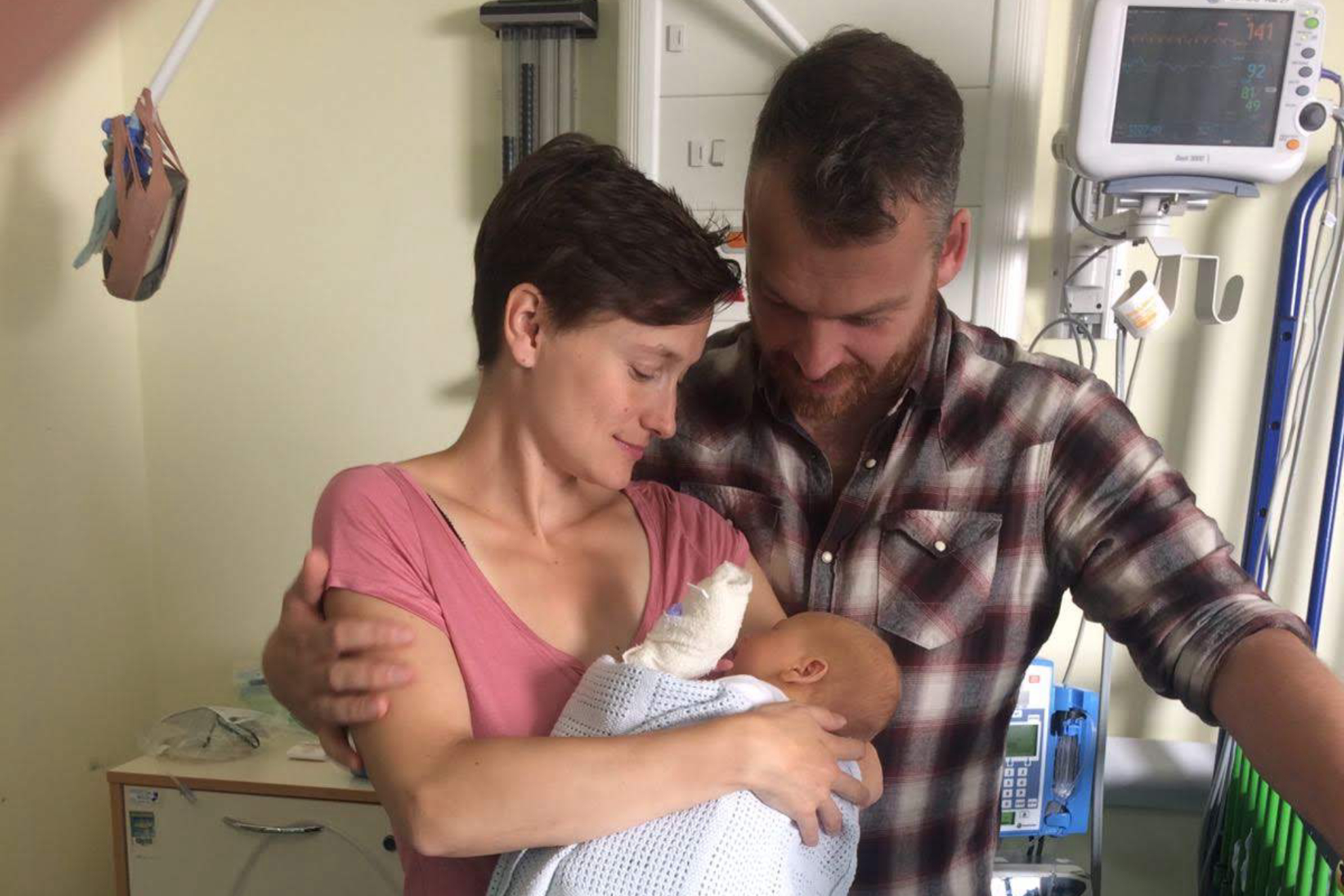Grieving parents warn about lethal herpes virus after their newborn son dies

James de Malplaquet and Sarah Higson’s son Kit died at just 13 days old from the deadly virus, which can be passed on by touch.
The heartbroken parents are raising awareness about how a common virus can kill newborn babies.
James and Sarah have now set up a charity, The Kit Tarka Foundation, to prevent neonatal deaths through research and education.
Kit was born at the Royal Sussex Hospital in Brighton last September.
He was born healthy at 39 weeks by an emergency C-section but was placed into special care due to low blood sugar.
The parents reported that their son was ‘incredibly sleepy, not waking up for feeds and not responding to pain’, but the doctors told them that he was just a ‘sleepy baby’ and not to worry.
The newborn was discharged from special care after six days but the family remained in hospital for two extra days as Kit showed signs of jaundice. He was eventually allowed to go home on his eight day.
GoodtoKnow Newsletter
Parenting advice, hot topics, best buys and family finance tips delivered straight to your inbox.
The infant struggled to feed and wake up at home, and returned to the children's hospital the following day. The staff immediately recognised that something wasn't right, but couldn't find out the reason. Kit's blood test showed infection markers, and the doctors suspected a bacterial infection despite the fact Kit had been on antibiotics for three days.
Over the next few days the newborn's condition improved before deteriorating rapidly, after which he was admitted into intensive care at the Evelina London Children's hospital. Staff did everything they could to save him, but tragically Kit died the next day.
The Evelina doctors immediately suspected a viral infection and asked if the parents or any of Kit's visitors had had cold sores.
Blood tests after Kit's death confirmed he was infected with herpes simplex virus (HSV), the same virus that causes cold sores in adults.
Sarah, 37, said: ‘I remember them trying to resuscitate him, trying to bring him back by pumping his little body.
‘That still haunts me.’
https://www.facebook.com/kittarkafoundation/photos/a.2132768400333326/2132977386979094/?type=3&theater
The Kit Tarka Foundation states that when newborns are infected with HSV, in 90 per cent of cases it is transmitted to the baby from the birth canal, although in Kit’s case, mum Sarah's tested negative for HSV and Kit was born by Caesarean. Kit's father James had not had a cold sore for years.
The charity also wishes to stress that that 95 per cent of babies whose mothers have HSV before getting pregnant, or who contract it in the first two trimesters, will be protected from infection as they have been passed antibodies from the mother.
Nicola Ranger, Chief Nursing Officer for the Brighton & Sussex University Hospitals NHS Trust, said: ‘HSV infection is very rare in babies and can often be very difficult to diagnose.
‘We are supporting the Kit Tarka Foundation to raise the profile of neonatal HSV infection and absolutely support the Foundation’s mission and vision.’
For more information, visit The Kit Tarka Foundation website.
Herpes simplex virus (HSV) is the cause of neonatal herpes in babies and cold sores in adults. You can catch HSV when you come into contact with people or things that carry the virus, for example you can get it from kissing someone who is infected, or sharing eating utensils.
NHS states that a cold sore usually starts with a tingling, itching or burning feeling. Small fluid-filled blisters can appear anywhere on the face, but they usually appear somewhere near the mouth.
They should start to heal within 10 days, but they are very contagious, particularly when the blisters burst.
It’s extremely important to avoid touching babies while you have a cold sore.
The NHS says: ‘Herpes can be very serious for a young baby, whose immune system won’t have fully developed to fight off the virus.’
HSV can be passed on during vaginal birth if the mother had genital herpes for the first time within the last 6 weeks of her pregnancy.
Breastfeeding mums can also pass on the virus if there are herpes sores on her breast, which can develop after touching her cold sore and then her breast.
The NHS recommends that if you have cold cores or think you’re coming down with a herpes infection…
- Do not kiss any babies
- Wash your hands before contact with a baby
- Wash your hands before breastfeeding and cover up any cold sores to avoid accidentally touching your mouth and then breast
Visit the NHS website for more information on cold sores and neonatal.
Trusted, informative, and empathetic – GoodToKnow is the ultimate online destination for parents. At GoodtoKnow, our mission is 'simple': we're trying to make sense of parenthood. On the site, you'll find everything you need for a happy, healthy family life. Our huge archive of content includes more than 18,000 articles and 1,500 how-to videos. These include expert-backed advice features on parenting, dealing with relationship changes after having a baby, self-care for mums and managing your family finances. We also feature tried-and-tested product reviews and buying recommendations for every stage of family life - from prams and Moses baskets to birthday gifts and top toys.